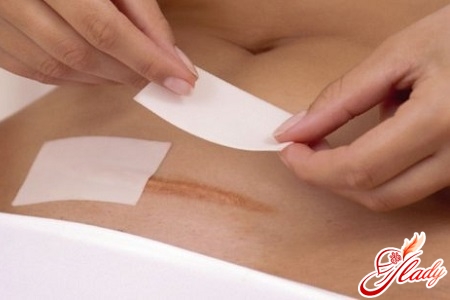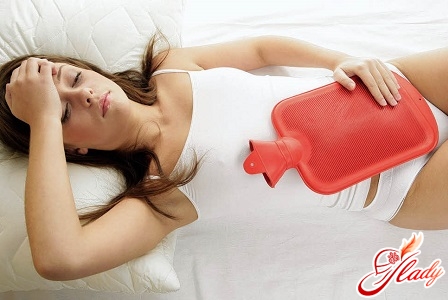 In our time, the birth of a person isis not a mystery of nature, but nothing more than a medical manipulation. And a cesarean section is a surgical operation. And, unfortunately, doctors have been resorting to cesarean sections more and more often lately. Moreover, many expectant mothers themselves ask doctors for this operation, fearing pain. It would seem that the ideal option is no pain, no fear. But if women knew in advance what awaits them in the postoperative period, the ranks of those desiring a cesarean section would be greatly thinned. And it is no coincidence - the pain alone is worth something! No matter how good a specialist performs the operation, tissue damage is inevitable. And it will take a lot of time for them to heal - sometimes young mothers complain that their stomach hurts after a cesarean section even after six months. But sometimes a cesarean section is the only way to deliver a baby that allows you to keep both mother and baby healthy. And there is no other way out - as they say, of two evils you must choose the lesser. But in any case - whether this is your decision or a forced one - be prepared for a difficult recovery period, the main discomfort during which will be pain. In order to get rid of pain, you need to understand the reasons for its occurrence - otherwise the fight will be unsuccessful. Of course, first of all, you should consult a doctor - only he can establish the cause reliably and quickly. But a little knowledge will not hurt the woman herself, of course.
In our time, the birth of a person isis not a mystery of nature, but nothing more than a medical manipulation. And a cesarean section is a surgical operation. And, unfortunately, doctors have been resorting to cesarean sections more and more often lately. Moreover, many expectant mothers themselves ask doctors for this operation, fearing pain. It would seem that the ideal option is no pain, no fear. But if women knew in advance what awaits them in the postoperative period, the ranks of those desiring a cesarean section would be greatly thinned. And it is no coincidence - the pain alone is worth something! No matter how good a specialist performs the operation, tissue damage is inevitable. And it will take a lot of time for them to heal - sometimes young mothers complain that their stomach hurts after a cesarean section even after six months. But sometimes a cesarean section is the only way to deliver a baby that allows you to keep both mother and baby healthy. And there is no other way out - as they say, of two evils you must choose the lesser. But in any case - whether this is your decision or a forced one - be prepared for a difficult recovery period, the main discomfort during which will be pain. In order to get rid of pain, you need to understand the reasons for its occurrence - otherwise the fight will be unsuccessful. Of course, first of all, you should consult a doctor - only he can establish the cause reliably and quickly. But a little knowledge will not hurt the woman herself, of course.
Operating seam
In the first few days after surgeryintervention, pain is simply inevitable. Well, of course - the body tissues are severely injured and simply cannot help but hurt. However, even during this period of time, there are several reasons why the stomach may hurt. First, of course, it is the suture itself. The first few hours after the operation, the effect of anesthesia will persist and you will not feel any pain at all. However, then the pain will be quite strong and this intensity will persist for about five days. During this time, you will probably be injected with painkillers that will ease your condition. Very often, new mothers refuse painkillers due to fears that it will harm the baby - the doctor will prescribe only those drugs that do not get into breast milk. Therefore, there is no point in enduring the pain! Please note: sudden movements, coughing and even laughter will increase the pain many times over - this is normal and there is no need to be afraid. Just remember that you have just undergone major surgery, so beware of excessive physical activity. Your body will need at least two to three months for the recovery period. Although, of course, the pain will become weaker and weaker every day. After about five days, the pain will become weaker and weaker, but discomfort may persist for a month, increasing during physical activity. And then the scar will periodically make itself known with a dull pain and tingling - in some women, sometimes for several years. Carefully monitor your condition for the first few weeks after a cesarean section - if the pain becomes very acute, the stitches begin to fester or release any contents, your body temperature rises, you feel weak, have a headache and other symptoms of general malaise, seek medical help as soon as possible! There is a possibility that pathogenic microflora has entered the postoperative suture and an infection has begun. Delay in this situation can result in very serious health problems.
Problems with the intestines
Another problem that is often facedwomen face after a cesarean section - this is increased gas formation. Due to surgical intervention, the normal functioning of the gastrointestinal tract is disrupted, a huge amount of gases begins to accumulate in the intestines and, as a result, pain occurs. And the pain in this situation can be so strong that it is simply impossible to tolerate them, and the only way to get rid of them is to release gases. If you encounter such a nuisance, immediately tell your doctor. He will select special drugs that reduce gas formation and improve intestinal peristalsis. Such problems usually do not last long - no more than two weeks. Remember that in addition to medications, you simply need to monitor your diet - you must completely exclude from it all foods that increase gas formation: legumes, soy, carbonated drinks. However, this must be done by all breastfeeding mothers, regardless of whether they have problems with the intestines - You don't want your baby to have them, do you?
Reduction of the uterus
Yes, the genital tract of a woman who has had a cesarean sectionsection, do not suffer. But the uterus undergoes all the same changes. This means that after the baby is born, the uterus begins to decrease in size. This process is almost always accompanied by pain, because the uterus contracts. And add to this a fresh scar on the uterus - the pain will be strongest in the first few days, when the contraction is most active. It intensifies when the baby is attached to the breast - stimulation of the nipples provokes active contraction of the uterus. Gradually, this process will subside and come to naught in about two to three weeks. This process is completely natural and inevitable, but if the pain is too strong, tell your doctor about it. Especially if this pain is accompanied by profuse vaginal discharge, especially with an unpleasant odor, an increase in body temperature - all this should be a reason for an immediate visit to the doctor. Unfortunately, sometimes even after a cesarean section, pieces of placenta or blood clots may remain in the uterine cavity. This means that there is a risk of developing an acute inflammatory process of the uterine mucosa. This process is accompanied by very severe pain. This is a very serious disease, so self-medication in this case can pose a threat not only to your health, but also to your life. The only way to help a woman is to clean the uterine cavity. Do not be afraid - this procedure is always performed under general anesthesia. You will fall asleep and wake up in your room. Then there will be a course of antibacterial drugs and in about 10 days the young mother will be absolutely healthy. But only if the treatment is started on time!
Adhesive processes
Any surgical intervention - includingincluding a cesarean section - involves damage to many tissues and internal organs. And, unfortunately, adhesions may occur during the healing process. Most often, they form between intestinal loops, but sometimes they also appear near other internal organs. As a rule, pain due to adhesions occurs about a month and a half after surgery and can persist throughout life. Most often, the pain is weak, the pain is of a nagging, aching nature. However, in rare cases, there may be so many adhesions and the pain is so severe that doctors decide to perform surgery to restore the normal quality of life of their patient.
How to get rid of pain
Above we briefly talked about the main onesreasons that lead to a woman having a stomach ache after a cesarean section. Now let's take a closer look at how to get rid of this pain. But let's agree right away - you will only resort to all of this advice after consulting a doctor, because it is very important to make sure that your health is not in danger! You want your baby to have a healthy mother, right?
- Postoperative pain
In the first few days you will have to endure the painin any case. And the only way to get rid of it, as already mentioned, are analgesics. Never take any medications on your own! Firstly, you do not know what the result of the interaction of this or that drug with the drugs prescribed to you by the doctor will be. And secondly, the drug can get into breast milk and have a far from favorable effect on the baby. In addition to analgesics, the woman will be prescribed a drug that stimulates normal contraction of the uterus - perhaps the first few days after the operation after such an injection the pain will increase, but in general the period of restoration of the size of the uterus will be significantly reduced. Such drugs, as a rule, are not used for a long time - a maximum of several days. In addition, the doctor often decides on the need for a course of antibacterial drugs - they exclude the possibility of developing an inflammatory process and, as a result, various complications. What can you do during this period? No matter how strange it may sound, but often in order to reduce pain in the future, you will have to consciously go for it. Very often women treat themselves in the postoperative period as if they were a crystal vase - they try not to breathe too much. So - that's true - sudden movements should be limited. But you still need to move and quite soon after the operation - already on the second day, a woman should begin to turn over in bed, and then try to get up. Be prepared for the fact that this will not be easy - acute pain, dizziness, and sometimes even nausea are almost inevitable. But each time you will feel better and better. Of course, talk to your doctor first - will he allow you such physical activity. If everything is in order and the doctor has given permission, start acting! Very often, new mothers feel incredibly sorry for themselves and they lie motionless as long as possible. But remember that the later you start moving, the longer and more severe your stomach will hurt. By the way, the best medicine for such pain will be your baby. If the operation went well, your precious child will be brought to your ward on the second day. And believe me - this sweet little angel will make you forget about your pain very, very quickly. Firstly, it is, of course, the joy of your maternal feelings. And secondly, whether you want it or not, but caring for the child falls on your shoulders almost entirely. And when the baby asks for food again, you are unlikely to pay attention to some pain in the lower abdomen, right?
- Problems with the intestines
It would seem that there are problems with the intestines -is a common phenomenon for a modern person. But for a young mother who has undergone a cesarean section, this problem can significantly spoil her life. Not only does the suture hurt, but also increased gas formation causes terrible discomfort. Flatulence after any surgical interventions is a common occurrence associated with the fact that bowel function worsens. However, if you take a number of measures, this phenomenon can, if not completely prevented, then at least reduced to a possible minimum. Firstly, if the cesarean section is planned, a few days before it you need to give up a number of products: spicy, fatty, smoked, soy, legumes, sweets, flour, carbonated drinks. Secondly, immediately after the operation, the doctor will most likely prescribe drugs that reduce gas formation. Thirdly, self-massage of the abdomen will not be superfluous. It is done very simply - stroke the lower abdomen with gentle circular movements. And finally, remember that the best way to activate the bowels is movement. So do not lie in bed for too long - at least walk around the ward. By the way, very often women experience certain problems with bowel movements after surgery. In no case should you be ashamed of this - immediately tell your doctor about it. The doctor will prescribe suppositories that will help facilitate bowel movements. Do not worry - you will not have to use them for a long time. It is difficult to go to the toilet only the first time, and then there will be no such problems. If you delay, you risk getting such an unpleasant procedure as an enema.
- We help ourselves
So, the days in the maternity hospital are behind you, you are home andthe recovery process is proceeding normally. But the pain in the lower abdomen, such a villain, does not allow you to live in peace? Well, this is natural and you should not be upset - everything will return to normal very soon. In the meantime, instead of complaining about the difficult lot of women, you can take a number of simple measures that will reduce the intensity of pain. If the suture hurts, remember about the bandage - it will serve you well in the first few weeks. It's very simple - your belly has not yet completely decreased in size, which means that by providing it with support, you reduce the intensity of pain many times over. Moreover, it is not necessary to buy a postpartum bandage: the one that served you faithfully during pregnancy will do just fine - just fold it in half and tighten it tighter. If the uterus itself hurts, try making a weak infusion of chamomile. To do this, put one teaspoon of dried chamomile flowers in a teapot and pour half a glass of boiling water over them, let it brew for an hour. Then use it as a regular tea. Just a cup of this chamomile tea in the morning and evening will reduce discomfort several times. And chamomile will not hurt the baby! By the way, it would not be superfluous to pay attention to the bedding of the young mother! You may be surprised, but your favorite soft crib is not the best option in the first couple of months after surgery. The bed during the recovery period should be quite hard - in this case, the pain will bother you much less. Of course, this does not mean that you need to immediately run to buy a new bed - you can limit yourself to a board placed under the mattress. Well, or a sofa in the living room, at worst. Many young mothers make the same mistake - they get too carried away with painkillers. But you shouldn't do this even if the drug was prescribed to you by a doctor - yes, it won't harm the baby, but it can cause addiction. Simply put, the body will forget how to cope with even mild pain on its own. Do you need it? You have your whole life ahead of you! Therefore, starting from the second or third week after the operation, you need to gradually give up pills. Yes, at first it will be difficult for you - try to distract yourself from the pain by switching your attention to something else. A young mother has enough worries? Having done something, you will most likely very quickly forget about the pain that has just bothered you. If the pain is so severe that you cannot do without pills even after a month - you should worry. With a normal course of the postpartum period, there should simply be no acute pain by this time. If it persists, contact your doctor immediately! Unfortunately, you most likely encountered some postpartum complications. And there are quite a few of them - this includes acute inflammation of the uterine mucosa, and divergence of internal sutures, and their suppuration. In any case, a doctor should look for the cause and prescribe appropriate treatment.









